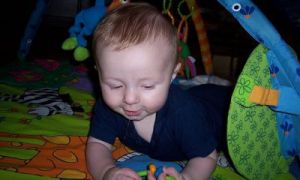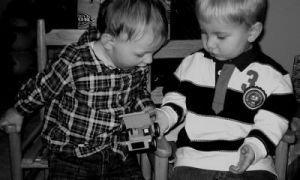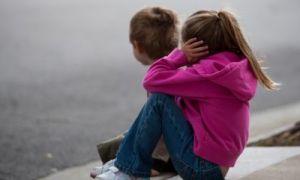

Infants begin to develop trust when parents begin to fulfil their needs. Such as changing an infant's nappy when needed, feeding on request and holding them when they cry. Infants cry to express anger, pain and hunger. It is their way of communicating with the world around them.
Language not only refers to the spoken word but it also incorporates gesturing, facial expressions and verbal sounds. This is why language development for infants begins from when your baby is born. Infants are aware of sounds in the environment. They listen intently to other's speaking and begin to cry if they hear an unexpected noise. This is all part of your infant's language development.
From when an infant is born the part of the brain that controls vital functions like sucking, swallowing and breathing are ready to go, However the part that controls the neck muscles, arms, legs, etc is still under development until an infant achieves Gross Motor Development.
Fine Motor involves the development of the small muscles of the body. The development of small muscles enables infants to carry out actions like grasping small objects. The fine motor skills developed from infancy continues throughout childhood in preparation of fine motor tasks such as writing.
Beginning at birth the construction of thought processes, such as memory, problem solving, exploration of objects etc, is an important part of an infant’s cognitive development. An infant needs to interact with their environment in order to learn about it. By using their senses, infants educate themselves about the world around them.
This article describes what to expect from a New Born Baby, Appearance, Physical Characteristics of a newborn, average weight, head, hair, skin, genitals, umbilical cords, etc.. This guide will prepare all new parents on what to expect when you deliver the baby.
What an exciting time... your baby is finally moving on from milk to solids. This is a crucial stage in your baby's development. From now on, the rapid growth and development of your baby requires more nutrients that milk alone cannot provide. It is also important to remember that starting on solids is an ongoing process where you have to pay special attention to any food allergy symptoms that your baby may present.
You have just become parents for the first time....a baby is a wonderful miracle...you hold your baby gently in your arms as you admire your new addition to the family. You pull your baby in close to give your child a gentle kiss and then you smell something, it's strong and it smells like...Yes, it's time to change the nappy!
Sometimes you hold your baby in your arms, talking gently, swinging softly side to side and then….the crying starts. You've checked your baby’s nappy it’s clean, feeding has already been done so your baby isn’t hungry and they already went down for a nap... You have tried everything but you can’t seem to get your baby to stop, panic sets in as you begin to worry what is wrong with your little one… Don’t worry; this is a common problem for most parents dealing with a crying baby.
Sleep is a universal need and it's not just you who ends up frustrated and grumpy through no sleep. Babies that sleep well during the night are more likely to feel happy through out the day, however those who sleep poorly are more likely to feel irritable and I'm not just talking about your baby...
 Toddlers have a greater understanding of the world around them by this stage. Their cognitive development (also known as intellectual development and thinking skills) continues… Read More
Toddlers have a greater understanding of the world around them by this stage. Their cognitive development (also known as intellectual development and thinking skills) continues… Read More
 Infants begin to develop trust when parents begin to fulfil their needs. Such as changing an infant's nappy when needed, feeding on request and holding… Read More
Infants begin to develop trust when parents begin to fulfil their needs. Such as changing an infant's nappy when needed, feeding on request and holding… Read More
 Beginning at birth the construction of thought processes, such as memory, problem solving, exploration of objects etc, is an important part of an infant’s cognitive… Read More
Beginning at birth the construction of thought processes, such as memory, problem solving, exploration of objects etc, is an important part of an infant’s cognitive… Read More
 Toddlers want to do more on their own and do not like it when you begin to establish limits on their behaviour. Tantrums can become… Read More
Toddlers want to do more on their own and do not like it when you begin to establish limits on their behaviour. Tantrums can become… Read More
 Your preschooler is now able to focus their attention more accurately and is less influenced by distractions. The intensity of questions increase as your child… Read More
Your preschooler is now able to focus their attention more accurately and is less influenced by distractions. The intensity of questions increase as your child… Read More
 John Dewey is often seen as the proponent of learning by doing – rather than learning by passively receiving. He believed that each child was active,… Read More
John Dewey is often seen as the proponent of learning by doing – rather than learning by passively receiving. He believed that each child was active,… Read More
 Toddler advance and gains new skills in Gross Motor Development milestones achieved throughout earlier years. Co-ordination and challenges that could not be performed before such… Read More
Toddler advance and gains new skills in Gross Motor Development milestones achieved throughout earlier years. Co-ordination and challenges that could not be performed before such… Read More
 Erik Erikson developed a psychosocial theory to understand how we each develop our identities through eight stages of psychosocial development from infancy to adulthood. The… Read More
Erik Erikson developed a psychosocial theory to understand how we each develop our identities through eight stages of psychosocial development from infancy to adulthood. The… Read More
 At this point preschoolers begin to interact effectively with others. Play becomes more innovative and organized and “boyfriend” or “girlfriend” begins to emerge. Preschoolers have… Read More
At this point preschoolers begin to interact effectively with others. Play becomes more innovative and organized and “boyfriend” or “girlfriend” begins to emerge. Preschoolers have… Read More
 From now, babies begin to identify and respond to their own feelings, understanding other's feelings & needs and interact positively with others. A baby's social and… Read More
From now, babies begin to identify and respond to their own feelings, understanding other's feelings & needs and interact positively with others. A baby's social and… Read More

A baby’s cognitive development at this stage is very rapid and many changes take place...
See more...
Toddlers want to do more on their own and do not like it when you...
See more...
Divorce a common problem for a lot of families in today's society. Each individual family...
See more...© 2009-2025 Aussie Childcare Network Pty Ltd. All Rights Reserved.

